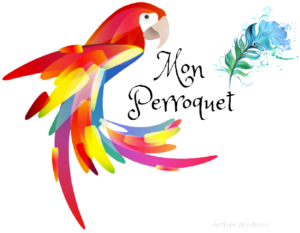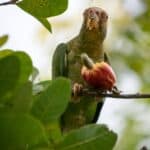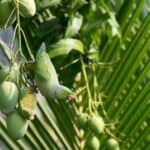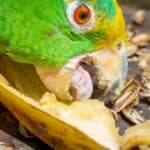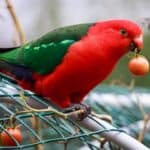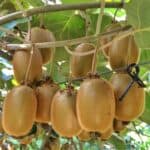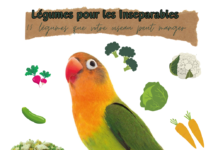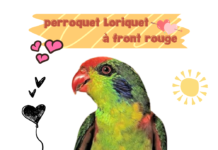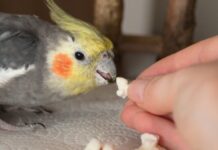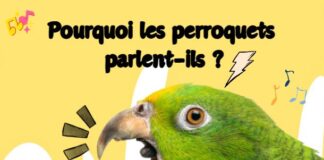Les perroquets sauvages mangent des noix parce qu’ils sont une riche source de protéines, de vitamines, de graisses saines et d’énergie. Cependant, pour un perroquet de compagnie, il y a le problème de la prise de poids car les perroquets domestiques ne font pas autant d’exercice. En outre, les arômes peuvent être nocifs, tels que le sel et le chocolat. Avant de les ajouter à l’alimentation de votre perroquet, découvrez quels types de noix sont sans danger.
Les perroquets peuvent manger des noix non salées et grillées à sec sans ingrédients ajoutés. Les meilleures noix pour les perroquets sont les pignons de pin, les amandes, les noix de macadamia, les noix de cajou, les noix du Brésil, les noix et les noisettes. Vous pouvez nourrir les perroquets avec des arachides (noix de singe) après qu’ils aient été rôtis. Les arachides crues ne doivent JAMAIS être données aux perroquets en raison de l’aflatoxine.
Certaines noix ont une plus grande probabilité d’abriter de la moisissure ou de déclencher des allergies chez les perroquets. Évitez donc de nourrir votre perroquet avec des noix non décortiquées à moins d’être certain qu’elles sont propres et sans moisissure. N’obtenez que des noix de sources réputées et inspectez de près celles dont les coquilles sont fissurées à la recherche de signes de moisissure.
Les noix sont-elles saines pour les perroquets?
Les noix sont bonnes pour les perroquets et font naturellement partie de leur régime alimentaire à l’état sauvage. Les perroquets se trouvent dans des habitats partout dans l’hémisphère sud, de l’Amérique centrale et du Sud à l’Australie. Ici, ils cherchent :
- Cajou
- Amandes
- Pistaches
- Châtaignes
- Noisettes
- Noix
On les trouve en abondance dans ces régions. Comme les perroquets ne sont pas des chasseurs naturels, ils dépendent de ces réserves de nourriture faciles à trouver. Une cache solide de noix peut fournir à un troupeau de perroquets:
- Protéine
- Graisse
- Cuivre
- Antioxydants
- Magnésium
- Fibre
- Vitamines et
Les perroquets peuvent voler sur de grandes distances, c’est donc une source d’énergie précieuse. Les noix aident également à garder leur bec fort, leurs plumes longues et saines, et leur esprit vif. En outre, casser les coquilles extérieures des noix fournit aux perroquets un enrichissement. Si vous voulez garder votre perroquet en bonne santé et actif, il vaut la peine d’incorporer des noix dans son alimentation.
Les noix sont-elles dangereuses pour les perroquets?
La plupart des noix ne sont ni dangereuses ni toxiques pour les perroquets. Cependant, votre perroquet ne cherchera pas de noix provenant de sources naturelles dans un habitat intact.
Il mangera des noix achetées en magasin qui peuvent être salées ou rôties avec des huiles et des arômes ajoutés. Les noix peuvent également être cultivées de manière incorrecte et contaminées par des forces extérieures. Avant de nourrir vos noix de perroquet, explorons les risques:
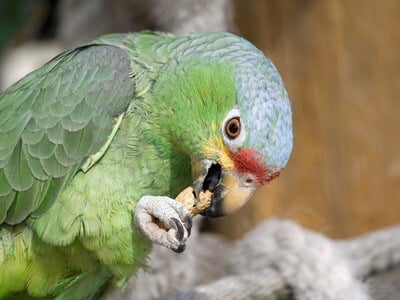
Additives
Parrots should not be given nuts that are salted, roasted in oil, or have added flavorings due to:
- Sodium
- Fats
- Synthetic ingredients that can’t be digested
So, give your parrot nuts that are natural and plain – dry-roasted, unsalted nuts are ideal.
Aspergillosis
Nuts can be infected with a toxin called aspergillus, derived from certain mold and other fungi. This can impact a parrot’s health by causing it to develop aspergillosis. This is a type of infection that causes:
- Shortness of breath
- Chest pain
- Difficulty breathing
- Fever
The aspergillus mold is naturally found outdoors. The human immune system can handle the negative effect effects of mold, but the smaller body of a parrot can be adversely affected.
This makes nuts dangerous because molds can grow inside nuts. Due to the shell, it can be hard to determine whether a nut is moldy. If your parrot has eaten enough moldy nuts, its health will decline quickly. It’s important to:
- Crack open and check any nuts before feeding them to the parrot, especially peanuts
- Wash all nuts under hot water to remove any traces of mold
- Get peanuts from reputable sources, such as grocery stores
- Check the sell-by date on the packaging
Allergies
Although rare, allergies can have negative effects on parrots. Common allergic reactions include:
- Itchy skin
- Swollen eyes
- Eye discharge
- Sneezing or wheezing
What Nuts Are Safe For Parrots
Few nuts contain toxins or compounds that are harmful to parrots. Let’s explore the nuts you can feed parrots:
Can You Feed Parrots Almonds?
Almonds are perhaps the best nut to feed your parrot. Not only are they easy to find in stores, but they also have the widest range of health benefits. Almonds have the highest amounts of:
- Protein
- Calcium
- Dietary fiber
On top of that, almonds are rich in omega-3 fatty acids. These perform many functions in a parrot’s body, such as:
- Preventing heart disease
- Reducing the chances of stroke
- Controlling arthritis
- Lowering the risk of atherosclerosis
Can Parrots Eat Bitter Almonds?
Sweet almonds are safe for your parrot to eat, but bitter almonds are toxic to parrots when eaten raw. That’s because they contain a substance called glycoside amygdalin. Bitter almonds are banned for sale inside the U.S. However, in most European countries, they can still be found for sale as they can be cooked to remove toxins.
Can Parrots Have Macadamia Nuts?
Macadamia nuts are safe for parrots to eat. However, they may not be the best choice of nuts for parrots. Macadamia nuts have the highest amount of fat per nut and the lowest amount of protein. While they’re still a good treat, this makes them less nutritious.
Macadamia nuts may have low protein levels compared to other nuts, but that amount is still significant. For 3 ounces of macadamia nuts, your parrot will receive 7 grams of protein. Macadamia nuts are also rich in vitamin B6, which:
- Metabolizes fats, proteins, and carbohydrates
- Creates red blood cells
- Renews neurotransmitters
These nuts are also high in minerals, such as:
- Manganese
- Thiamine
- Copper
- Magnesium
- Iron
Feed macadamia nuts raw to your parrot. Avoid fried and salted nuts.
Can Parrots Eat Cashew Nuts?
Cashews have the highest amounts of zinc and copper. That’s assists with blood creation, nutrient absorption, and eye health. Also, cashews contain minerals, such as:
- Selenium
- Iron
- Magnesium
- Manganese
- Phosphorus
Vitamins include:
Cashews have been linked to lower levels of cardiovascular disorders, such as stroke and heart disease. According to BMC Medicine, cashews reduce the risk of cancer and improve the survival rate of those with:
- Respiratory diseases
- Diabetes
- Infections
Are Cashews Too Oily For Parrots?
While this nut is healthy and safe for parrots, you may be concerned with how oily it is. However, cashews contain healthy oils, not the greasy additives you find on roasted or fried foods. These healthy oils are a product of the vitamins and minerals present in the nut itself.
Only feed cashews to your parrot in moderate amounts. They can be offered in their raw, unsalted form. You can also soak cashew nuts in water to reduce the amount of phytic acid in them.
Can Parrots Eat Monkey Nuts?
Also known as peanuts, monkey nuts are among the most common types of nuts. Peanuts can be a healthy treat for parrots, but they shouldn’t be offered to your parrot raw (uncooked).
This is due to the presence of Aflatoxin, which is toxic to the liver. Roasting peanuts reduces the amount of Aflatoxin, but peanuts should still be given in moderation, as it doesn’t remove the presence entirely.
Peanuts also have a higher chance of harboring mold compared to other nuts, leading to aspergillosis. According to Mycopathologia, aspergillosis can also be derived from other nuts, not just peanuts. However, peanuts contain more as they grow underground.
It’s sensible to shell, clean, and roast any peanuts before offering them to your parrot. Once they’re clean and roasted, your parrot will benefit from:
- Magnesium
- Protein
- B vitamins
- Fats
- Phosphorous
- Fiber
- Potassium
Peanuts are high in calories and can lead to obesity in parrots. 3-5 peanuts once or twice a week will suffice.
Can Parrots Eat Brazil Nuts?
This nut is known for its buttery texture, so it’s tasty when eaten raw. What’s more, Brazil nuts are safe to feed to your parrot. It’ll likely prefer the robust taste and silky exterior of Brazil nuts over other nuts.
Brazil nuts are good for parrots. Of the nuts on this list, they contain the highest levels of magnesium. This plays an important role in:
- Energy creation
- Developing proteins
- Repairing DNA and RNA genes
- Healthy nerves and muscles
Alongside that, Brazil nuts are one of the most concentrated dietary sources of selenium. This is an antioxidant responsible for boosting a parrot’s metabolism and maintaining a healthy thyroid.
A healthy metabolism prevents digestive issues and improves the way your parrot absorbs nutrients. This is also credit to the thyroid, which plays a role in improving a parrot’s growth and development.
According to the Journal of Clinical Endocrinology and Metabolism, the thyroid contains more selenium than any body part. A lack of selenium has been linked to higher risks of hypothyroidism and autoimmune thyroiditis.
Can Parrots Eat Walnuts?
Walnuts are sweet and buttery in texture. If they’re bland and unsalted, they’re a healthy addition to your parrot’s diet. With 1-2 walnuts a day, your parrot can benefit from:
- Vitamin B6, E, and B9
- Copper
- Manganese
- Phosphorus
Walnuts are also full of antioxidants. These antioxidants come in the form of plant compounds, most concentrated in the walnut’s brown skin. They include:
- Ellagic acid
- Catechin
- Melatonin
- Phytic acid
These lower the risk of diseases related to aging. With 1-2 walnuts, your parrot will absorb nutrients more effectively and be able to maintain a more balanced sleep cycle.
Walnuts have the highest amounts of omega-3 fatty acids of all nuts. Specifically, that’s 2.5 grams of omega-3 per ounce of walnuts. According to the American Journal of Clinical Nutrition, the omega-3 found in walnuts lowers the risk of mortality from heart disease by 10%.
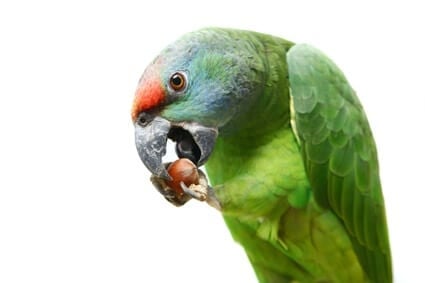
Can Parrots Eat Pine Nuts?
Parrots can safely eat pine nuts, just like most tree nuts. These are the primary source of fat and protein for species like the thick-billed parrot. These nuts are also a good source of:
- Vitamin E
- Manganese
- Phosphorus
- Calcium
- Vitamin K
- Fiber
This can aid in your parrot’s digestion, strengthen bones, and improve the vibrancy of feathers.
Can Parrots Eat Hazelnuts?
Known as the filbert, hazelnuts have a sweet flavor. These nuts have a high amount of vitamins and minerals, including:
- Vitamin E
- Vitamin B6
- Thiamin
- Folate
- Magnesium
- Copper
- Manganese
- Potassium
- Phosphorus
- Zinc
These nuts have a high amount of:
- Fiber
- Carbohydrate
- Protein
- Antioxidants
Are Hazelnuts The Best Nuts For Parrots?
Some owners believe that hazelnuts are the best nuts for parrots. Their antioxidants fight oxidative stress, which has been linked to cell damage. Oxidative stress can cause aging, cancer, heart diseases, and other diseases.
According to the Annals of Nutrition and Metabolism, hazelnuts are linked to lower levels of oxidative stress. The study determined that a higher level of hazelnut consumption lessened the damage on DNA in the observed patients.
That makes them a great choice for parrots that are aging or repairing their immune systems. Likewise, if you’ve recently adopted a malnourished parrot, hazelnuts can help them regain lost weight and improve their health.
Always feed raw hazelnuts to your parrot. The antioxidants present in hazelnuts are also largely concentrated on their skin. Roasting has been shown to lower the levels of antioxidants.
How Many Nuts Should You Feed Your Parrot?
Parrots can be given 2-3 nuts a day, depending on their level of activity. This can be reduced to 2-3 nuts for older or more sedentary parrots 3-4 times a week. If a parrot is overfed nuts, you may find that your parrot:
- Refuses to eat other foods
- Becomes overweight
- Grows lethargic and ill-tempered
Can Parrots Eat Unshelled Nuts?
Avoid giving your parrot unshelled nuts due to the mold that may exist within. Parrots are capable of tearing apart the thicker shells of walnuts or the softer shells of peanuts. In fact, this process will serve as enrichment.
However, mold can more easily hide within an unshelled nut. You will not be aware the nut is contaminated until the shell is opened and your parrot has already eaten it. So, it’s wise to shell any nuts before feeding them to your parrot. For denser nuts, like hazelnuts or walnuts, your parrot will still enjoy gnawing through the nut itself.
Be suspicious if you see any cracks in the shells of nuts. This means that the nuts have been exposed to moisture and air, increasing the chances of mold growth. Parrots can safely eat most nuts but never feed a parrot raw peanuts (they MUST be roasted) due to the presence of Aflatoxin.
